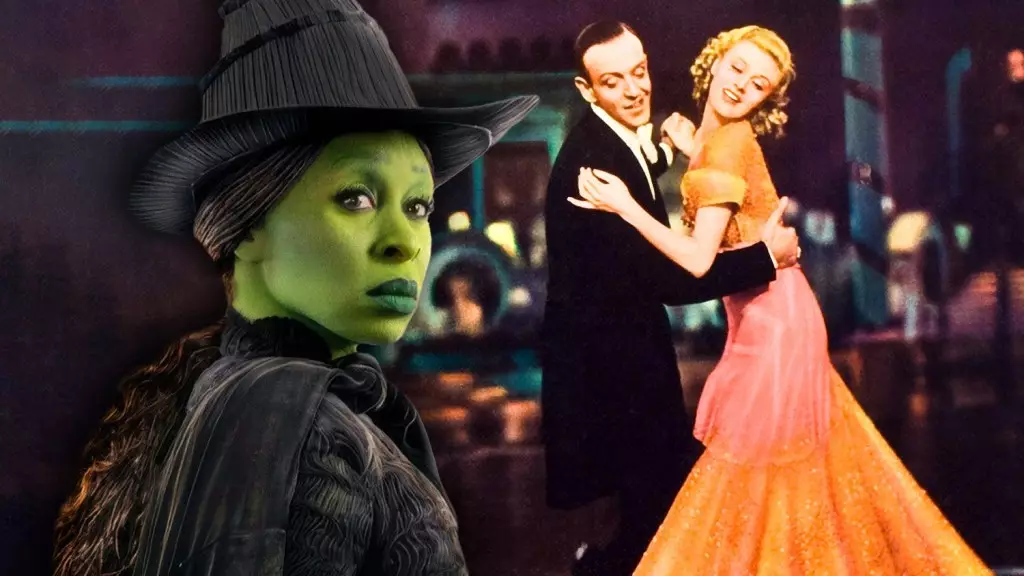The global pandemic offered many of us solace through the comforting allure of classic musicals, with enchanting melodies from “Singing in the Rain” or the nimble footwork of Fred Astaire in “Top Hat” acting as metaphorical lifebuoys during uncertain times. While these films served as nostalgic escapes, the musical genre has evolved, emerging from the shadows of its illustrious predecessors. Today’s musicals, while still acquiring accolades and box office successes, address themes that are palpably more intricate, merging joyous tunes with layers of complexity and emotional depth.
As the traditional musical re-establishes itself at the forefront of contemporary cinema, the genre has undeniably attracted the attention of critics and audiences alike. With recent high-grossing films such as “Wicked” raking in over $500 million, it’s clear that the musical has regained its footing in the film industry. Notable talents like Timothée Chalamet, Selena Gomez, and Ariana Grande are amongst those gathering award nominations this season, highlighting the increasing recognition of performers who portray characters that grapple with complex emotional realities.
Yet, the celebration of musicals today contrasts sharply with the golden age of the genre, which often painted a canvas of simplistic joy and romantic escapism. The icons of the past, like Gene Kelly and Fred Astaire, captured hearts while primarily embodying carefree spirits with simplistic storylines. In contrast, the protagonists of modern musicals find themselves engulfed in multifaceted lives that reflect societal dilemmas and existential struggles.
The shift in character development marks a significant pivot in the musical landscape. Insights concerning the characters portray a world that has evolved to be nuanced, often mirroring the complexities of real life. For instance, Timothée Chalamet’s portrayal in “Wonka” does not follow the predictable template of previous musical leads. Rather, it engages audiences by delving into the emotional and moral labyrinth faced by the characters, echoing sentiments that resonate with modern viewers.
This complex landscape extends beyond mere character arcs; it challenges pre-conceived notions of identity and societal expectations. In “Emilia Pérez,” the narrative navigates the intricacies of personal identity against the backdrop of clandestine dealings with a cartel. The emotional landscape is far from the naïve visions once portrayed in musicals like “Gigi,” which featured simple love stories devoid of the weight of real-world implications.
Contemporary musicals also tackle pressing themes that are relevant to today’s society. The evolution from light-hearted to deeply introspective allows for a richer exploration of humanity’s shared experience. For example, in “Cats,” what is presented is an allegorical struggle that delves into societal judgment, acceptance, and the pursuit of self-identity, resonating with today’s culture of identity exploration.
Moreover, the caliber of performances by contemporary stars cannot be overstated. Artists like Ariana Grande and Cynthia Erivo not only perform but embody the struggles and triumphs of their characters, creating a bridge between the audience and the on-screen narratives. Their powerful voices and performances are reminiscent of the Broadway actors of yesteryear yet equally highlight the urgent emotional undertones that come with modern storytelling.
As the musical genre continues to adapt and redefine itself, it raises essential questions about how we perceive joy, identity, and the human experience. Award nominations and box office success illustrate only a fraction of the cultural impact these films have on audiences worldwide. The grandiosity of “Wicked” blends clever writing with emotional depth, ensuring that the storyline and music align harmoniously.
As we navigate through this new cycle of musicals, it becomes increasingly evident that they are more than just a return to an established genre; they are a compelling commentary on contemporary life. The evolution of characters and themes encapsulates a shift toward authenticity, where emotions are raw and complex, paving the way for a more profound appreciation of this enduring art form.
